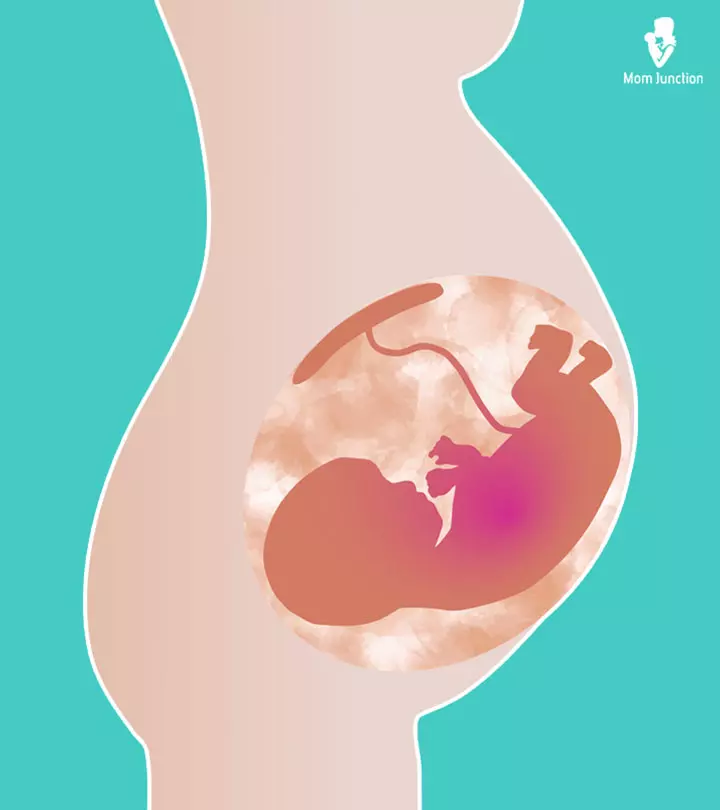
Image: ShutterStock
If you’re thinking, ‘Can you take Tamiflu while pregnant?’ the answer is yes. Tamiflu in pregnancy may be prescribed as a treatment for the flu. Women go through alterations in their cardiovascular, respiratory, and immune systems during pregnancy. Hence they are more prone to viruses such as the influenza virus, the causative agent of the flu (1).

Although adopting various preventive measures, such as administering vaccines, is considered the first line of defense, medications may be suggested for treatment. Scroll through to know about Tamiflu and its safety for pregnant women, including its side effects and some tips to help you avoid contracting the flu while pregnant.
Key Pointers
- Tamiflu is a medication used to treat the flu and should be taken under a doctor’s guidance during pregnancy.
- Side effects of Tamiflu may include stomach pain, nausea, and vomiting, as well as more serious effects like hives, peeling skin, seizures, and hallucinations.
- Tamiflu cannot be used in place of vaccination or as an antibiotic to treat infections.
- It’s important to detect and treat the flu early to avoid negative outcomes in high-risk populations.
- Preventing infection can be achieved by avoiding close contact with infected individuals, practicing good hygiene, and maintaining a healthy diet.
What Is Tamiflu?
Tamiflu is the brand name for oseltamivir, a drug used for treatment and prophylaxis of flu caused by the influenza virus (2).
It belongs to the class of drugs called neuraminidase inhibitors, which block the enzyme that the virus spreads (3). It is available in two major forms, capsule and liquid (oral suspension).
Can You Take Tamiflu (Oseltamivir) When Pregnant?

The US FDA has approved Tamiflu for the treatment of influenza virus during pregnancy. However, this drug belongs to Pregnancy Category C, which means that there are no adequate and well-controlled studies in humans (4).
Recalling her experience of being prescribed Tamiflu just three weeks before her due date, Livia Dabs, a mother and blogger, outlines, “They called the OB from the fourth floor to check on me. Everything was fine with the baby. The young doctor prescribed Tamiflu and sent me home with the instruction if it gets worse to call or return to the ER. The next morning, I felt even worse. I couldn’t keep the Tamiflu in; I was vomiting and unable to keep anything inside. My temperature was still very high.
“We returned to the ER, and I promised myself I would stay here until I got better. They checked everything again. The baby was in mild distress but nothing serious. They assumed it was H1N1. Indeed, three days later, the test returned positive. However, one week later, I got discharged; I was symptom-free, and three weeks later, I delivered a beautiful baby girl (i).”
Tamiflu is prescribed if the potential benefits outweigh the risks. Therefore, you should take the drug only if it has been prescribed by your physician or after consulting with a medical professional.
The Centers for Disease Control and Prevention (CDC) recommends antiviral treatment to be started within 48 hours of diagnosis for pregnant women during any trimester (1).
 Experts say
Experts sayWhat Could Be The Side Effects Of Tamiflu During Pregnancy?
The potential side effects of taking Tamiflu include diarrhea, stomach pain, nausea, and vomiting (5). These symptoms can be bothersome but will subside in a few days. Take medicine after you eat something, as it can upset the digestive system when taken on an empty stomach.
Serious side effects include allergic reactions with the following symptoms:
- Hives or rash

- Skin peeling and blisters
- Sores and blisters in the mouth
- Itching
- Tightness and pain in the chest
- Difficulty talking
- Confusion

- Seizures
- Hallucinations
If you experience any of these symptoms, let your doctor know about it.
If you experience any of these symptoms, let your doctor know about it.
Tamiflu (oseltamivir) is unlikely to cause any adverse effects on pregnancy or the development of the fetus. There is limited research on this aspect (6).
How Much Tamiflu Is Safe To Take During Pregnancy?

The recommended oral dosage is one 75mg capsule two times a day, for five days or as suggested by the doctor for treatment (7). Tamiflu 75mg once a day dose is given for prevention. Your doctor might adjust the dose based on the kidney function.
 Point to consider
Point to considerGeneral Precautions To Follow While Taking Tamiflu
To ensure your safety and act with caution, keep the following points in mind when taking the prescribed dosage of Tamiflu (8).
- Tamiflu is not a substitute for flu vaccination.
- It is not an antibiotic drug and thus cannot be used to treat bacterial infections.
- It should always be consumed along with food or after food.
- If you have already received the nasal flu vaccination, you should wait at least two weeks before taking this drug (9).
- Treating the flu virus at the nascent stages is crucial for high-risk individuals such as pregnant women, and people with underlying health issues (heart diseases, diabetes, and weakened immune systems) (10).
- Inform your doctor about any previous illnesses or medical conditions before getting a prescription and purchasing this medication from a pharmacist.
Ways To Prevent A Flu Infection During Pregnancy

The complications of a flu infection during pregnancy can be serious. While antiviral drugs like Tamiflu work as the second line of defense, preventive measures are always the first line of defense.
Here are a few measures recommended by the CDC (11)
- Get a flu vaccination to protect the mother and the baby from the flu as pregnant women are at higher risk of developing flu (10).
- Avoid close contact with people who are sick.
- Wash your hands often to keep away from germs.
- Avoid touching your nose, eyes, or mouth if you feel your hands might be infected.
- Always clean and disinfect your surroundings, and boost your immunity by staying active and eating nutritious food.
Frequently Asked Questions
1. Can Tamiflu cause congenital abnormalities?
Scientific studies have not found an association between fetal exposure to oseltamivir and congenital malformation (12).
2. Can the flu harm my baby when pregnant?
Yes, the flu may be harmful to your developing baby. The flu may be associated with an increased risk of neural tube defects and other adverse pregnancy outcomes such as miscarriage, pre-term birth, or low birth weight (10) (13).
3. Does Tamiflu cross the placenta?
Although Tamiflu is sometimes prescribed during pregnancy, research shows that it crosses the placenta and reaches your baby. According to a study in 2012, high levels of Tamiflu were detected in the umbilical cord of a pregnant woman who had received the drug (14).
4. How long will I remain contagious with the flu during pregnancy?
If you develop the flu during pregnancy, you may be contagious from one day before you see the symptoms to five or seven days after falling sick (15).
5. How long should I quarantine myself with the flu?
People having the flu should quarantine themselves for at least 24 hours until their fever is gone. Individuals who are confirmed with flu symptoms but no fever should remain at home for four to five days (16). If you have a fever during pregnancy, it is best to consult your doctor about further tests, as it may be a precursor of the flu.
Tamiflu is a medication usually prescribed for flu caused by the influenza virus. But is Tamiflu safe during pregnancy? The answer is yes if prescribed by a healthcare professional. However, before taking this medication, talk to your doctor about the dosage, potential side effects, and precautions. Though your symptoms could resolve after you begin the course of medication, you must not skip or discontinue using it unless your doctor says so. Nevertheless, you may follow preventive measures such as frequent handwashing, maintaining clean surroundings, and getting a flu shot to avoid flu infection during pregnancy.
Infographic: General Precautions To Follow When Using Tamiflu
Tamiflu is an antiviral medication to treat influenza infections. It may be used during pregnancy if the benefits outweigh its risks. The infographic below provides some safety precautions if you have been prescribed Tamiflu during pregnancy.

Illustration: Momjunction Design Team
Illustration: Tamiflu While Pregnant: Safety Profile Dosage And Side Effects

Image: Dall·E/MomJunction Design Team
Personal Experience: Source
MomJunction articles include first-hand experiences to provide you with better insights through real-life narratives. Here are the sources of personal accounts referenced in this article.
i. I survived malaria and swine flu and here is what I learned.https://medium.com/illumination/i-survived-malaria-and-swine-flu-and-here-is-what-i-learned-bc83402f1e7e
References
1. Recommendations for obstetric health care providers related to use of antiviral medications in the treatment and prevention of influenza; Centers for Disease Control and Prevention
2. Oseltamivir; MedlinePlus, US National Library of Medicine
3. Moushumi Sur, et. al.; Oseltamivir; NCBI(2025)
4. Treatment of influenza during pregnancy; Information by Drug Class; US Food and Drug Administration
5. Oseltamivir; Michigan Medicine, University of Michigan
6. Vera Ehrenstein, et.al.; Oseltamivir in pregnancy and birth outcomes; NCBI(2018)
7. Pregnancy and the flu; University Of Florida Health
8. Summary of product characteristics; Global Health Press
9. Questions & Answers: Antiviral Drugs, 2009-2010 Flu Season; CDC
10. Flu & Pregnancy; Centers for Disease Control and Prevention
11. Healthy habits to help prevent flu; CDC
12. Vera Ehrenstein et al.; Oseltamivir in pregnancy and birth outcomes; BioMed Central
13. Flu during pregnancy; University of Minnesota
14. FLU NEWS SCAN: Oseltamivir across placental barrier, H1N1 risk factors, dual-use system; University of Minnesota
15. Flu While Pregnant; Cleveland Clinic
16. Stay home when you are sick; Centers for Disease Control and Prevention
Community Experiences
Join the conversation and become a part of our nurturing community! Share your stories, experiences, and insights to connect with fellow parents.
Read full bio of Dr. Anita Gondy
Read full bio of Sakshi Mishra
Read full bio of Rebecca Malachi
Read full bio of Dr. Joyani Das

















